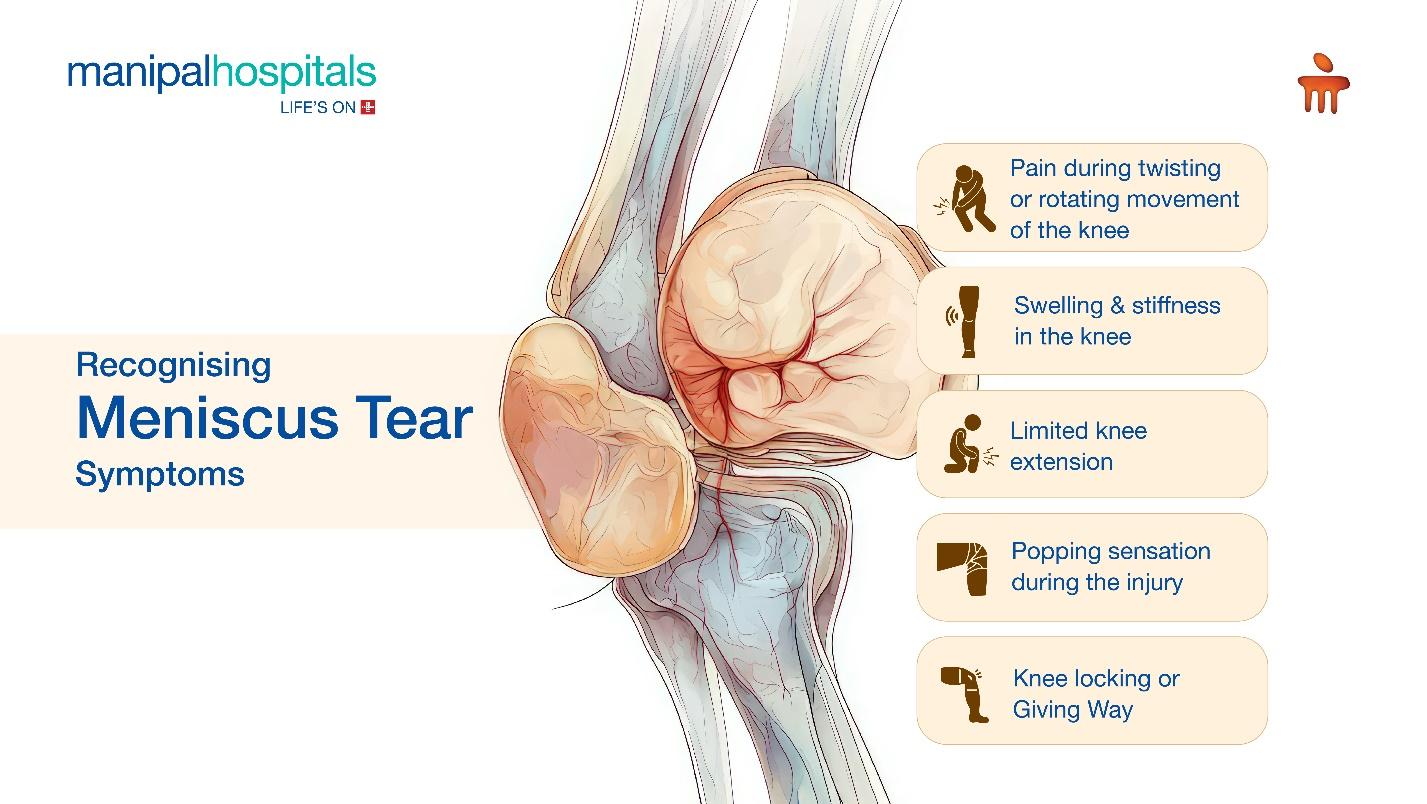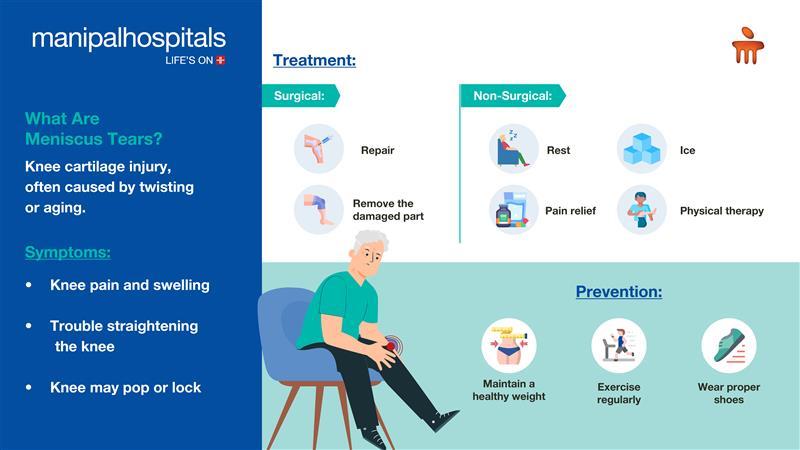
Listen to article
Loading audio...
A meniscus tear is an injury to the cartilage that cushions and stabilises your knee joint. Your knee has two menisci - one on the inner side (medial meniscus) and one on the outer side (lateral meniscus). These C-shaped pieces of cartilage act as shock absorbers between your thighbone (femur) and shinbone (tibia). Meniscus tears are a common knee injury, particularly in athletes who play contact sports or engage in activities that involve twisting motions.
| Did You Know that According to a 2022 study published in the "Indian Journal of Orthopaedics," meniscal injuries account for approximately 15% of all knee injuries in India? Proper diagnosis and early treatment are crucial for maintaining mobility and preventing further damage. |
Synopsis
Causes and Risk Factors of Meniscus Tears
Several factors can contribute to the development of a meniscus tear: Here are the major causes of meniscus tears:
-
Trauma or sudden injury: A forceful twist or rotation of the knee, often during sports or physical activity, can cause a meniscus tear.
-
Degenerative changes: With ageing, the meniscus may weaken and become more tear-prone, even with minor trauma.
-
Certain sports: Activities that involve pivoting, squatting, or tackling, such as football, rugby, tennis, and basketball, increase the risk of meniscus tears.
-
Obesity: Carrying excess weight puts additional stress on your knee joints, making them more susceptible to injury.
Symptoms of Meniscus Tears

The symptoms of a meniscus tear can vary on the basis of injury severity. Common signs and symptoms include:
-
Pain, especially when you twist or rotate your knee
-
Swelling or stiffness in the knee
-
Difficulty straightening your knee fully
-
A popping sensation during the injury
-
A sensation of your knee locking or giving way
If you experience any of these meniscus tear symptoms after a knee injury, it is essential to consult an orthopaedician in Pune for an accurate diagnosis and appropriate treatment.
Diagnosing Meniscus Tears
To diagnose a meniscus tear, your doctor will typically do the following:
-
Take a medical history: They will ask about your symptoms, how the injury occurred, and any previous knee problems.
-
Perform a physical examination: Your doctor will check for tenderness, swelling, and range of motion in your knee. They may also perform specific tests, such as the McMurray test, to assess the integrity of your meniscus.
-
Order imaging tests: X-rays can help rule out other conditions, such as fractures, while an MRI can provide a detailed view of the soft tissues in your knee, including the meniscus.
Treatment Options for Meniscus Tears
The treatment for a meniscus tear injury depends on several factors, including the size and location of the tear, your age, and your activity level. Meniscus tear therapies and treatment options include:
Non-Surgical Treatment
For minor tears or in cases in which surgery is not recommended, non-surgical treatment may be sufficient. This can include:
-
Rest, ice, compression, and elevation (RICE) to decrease the amount of pain and reduce the swelling
-
Non-steroidal anti-inflammatory drugs (NSAIDs) for pain management and inflammation
-
Physical therapy for improvements in strength, flexibility, and range of motion
Surgical Treatment
In some cases, surgical intervention may be necessary to repair or remove the damaged meniscus. The two main surgical options are:
-
Meniscus repair: If the tear is in an area with good blood supply, the surgeon may be able to suture the torn edges together, allowing the meniscus to heal.
-
Partial meniscectomy: If the tear is in an area with poor blood supply or if there is extensive damage, the surgeon may need to remove the torn portion of the meniscus.
Consult our orthopaedic hospital in Pune if you need meniscus tear treatment.
Prevention of Meniscus Tears

While not all meniscus tears can be prevented, there are steps you can take to reduce your risk. Here are a few insights on how to prevent meniscus injury.
-
Maintain a healthy weight to minimise stress on your knee joints
-
Engage in regular exercise to strengthen the muscles that support your knees
-
Make sure your technique is correct when participating in sports or physical activities
-
Wear appropriate, well-fitting footwear
-
Gradually increase your workout intensity and duration
If you suspect you have a meniscus tear or are experiencing persistent knee pain, it is crucial to consult a specialist. An orthopaedic surgeon or sports medicine physician can make an accurate diagnosis and structure a personalised treatment plan to help you recover and return to your daily activities. Remember, early intervention and proper management can lead to better outcomes and reduce the risk of long-term complications.
FAQ's
Yes, although it is uncommon, a meniscus tear can happen in both knees at the same time. This typically occurs due to severe trauma or degenerative changes affecting both joints concurrently.
Are there different types of meniscus tears?
Yes, there are several types of meniscus tears, including radial tears, horizontal tears, flap tears, and complex/degenerative tears. The type of tear influences the treatment approach and recovery process.
Healing time depends on the severity and location of the tear. Minor injuries might heal within 6-8 weeks with conservative treatments like rest and physiotherapy. More severe cases requiring surgery may take several months
While physical examination can suggest a meniscal injury, imaging tests like Magnetic Resonance Imaging (MRI) provide a more detailed view of the knee structures and confirm the diagnosis.
Non-surgical options include rest, ice application to reduce swelling, compression with bandages or braces for support, elevation of the leg to decrease inflammation (RICE method), anti-inflammatory medications like ibuprofen or naproxen (under guidance), and physiotherapy exercises aimed at strengthening surrounding muscles.



















 5 Min Read
5 Min Read


















